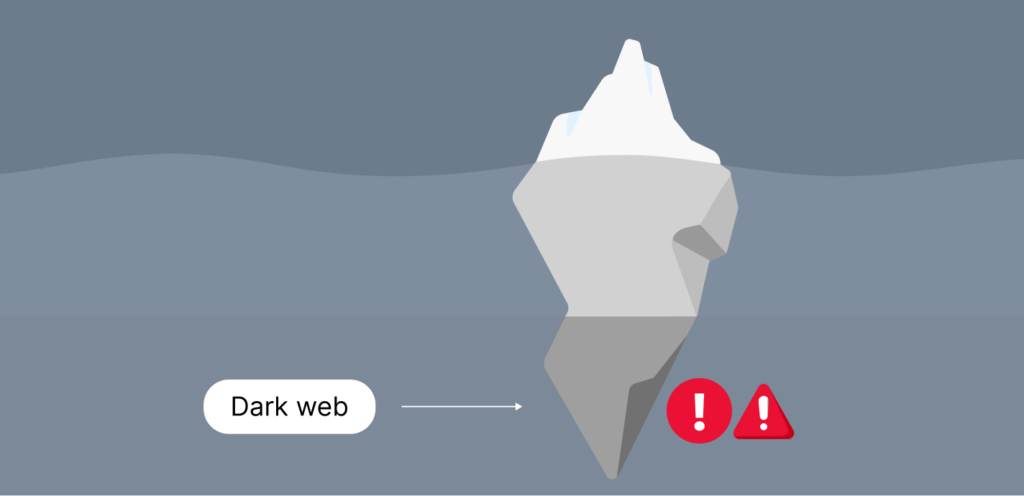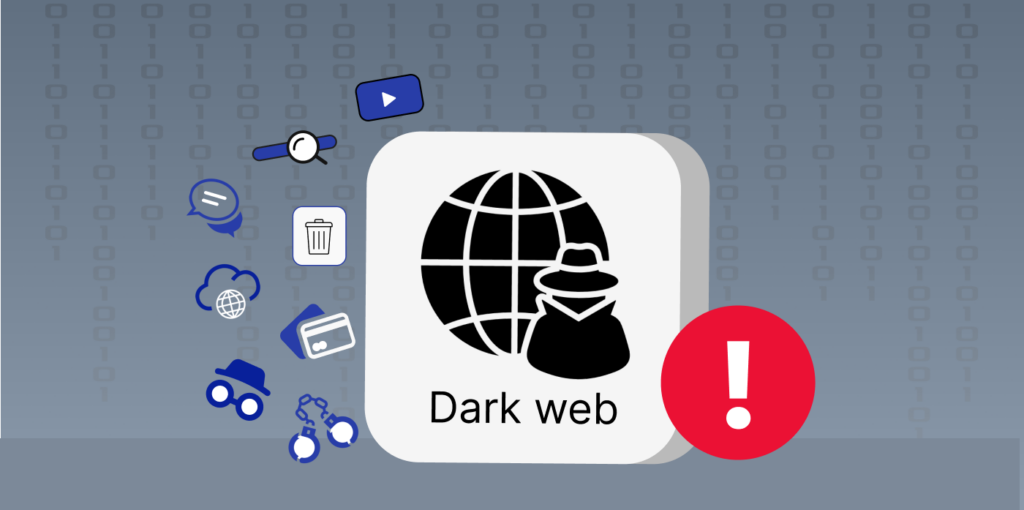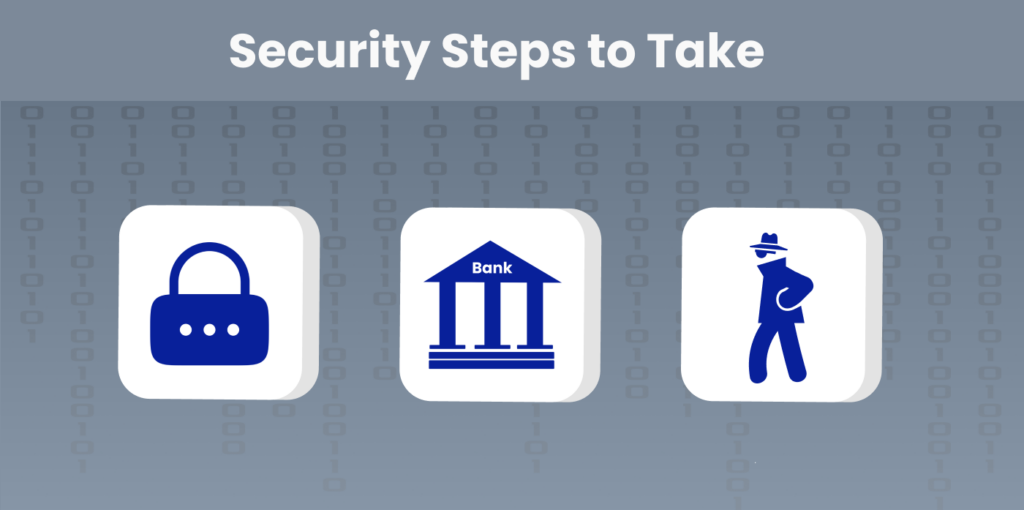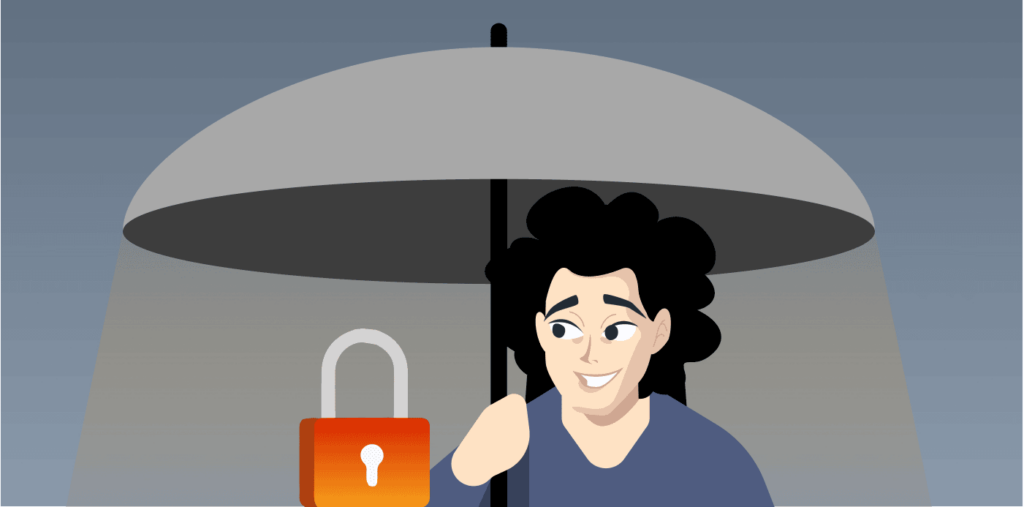Deep within the vast ocean of the internet lies the dark web, where private activities reach the highest level—people become faceless. Since its introduction, the dark web has been the hub of criminality, providing a meeting point for terrorists and a marketplace for drug traffickers. This makes it a place to avoid for every modest and decent human being except those needing to visit it.
So, if you get an alert about your information being leaked on the dark web, it’s normal to be curious about how and what steps to take. Luckily, you are in the right place. Keep reading to learn everything about dark web alerts and their prevention.
What is a Dark Web Alert?

A dark web alert notifies you that your sensitive data or information has been discovered on a dark web site. At first, it may be unclear how this constitutes an alert, as everyone’s data is available on the Internet in some way.
For instance, if you don’t have an account on Facebook or X, you’ve most likely used your data to register for some services delivered online, so why does a dark web alert become an issue? The answer lies in understanding the dark web and how it operates.
The internet has three main layers: the surface web, the deep web, and the dark web. The surface web is the most visible part of the internet, accessible via search engines like Google. The deep web and the dark web are not available on search engines. To access them, you need to have the website address you want to visit. The dark web, however, takes it up a notch and requires specialized browsers like the Tor browser to enter it.
This level of privacy and secrecy that the dark web commands makes it the perfect medium for conducting illegal activities. Websites on the dark web are infamous for facilitating large-scale crimes and fraudulent activities, including terrorism, drug dealing, and human trafficking.
Now, you may begin to understand why your data or any other information traceable to you should never be found on the dark web. This information can include:
- Email address
- Home address
- Name
- Social security number
- Credit card details
- Phone number
- Other personally identifiable information (PII)
If you’d like to know more about the dark and deep web, our article here discusses them in detail.
How Does Your Data Get on the Dark Web?
Corporate and large organizations to whom you provide your data are always accountable for data breaches, cybercrimes, and other targeted fraudulent attacks. The perpetrators of these acts typically take the stolen data and try to sell it to interested parties. They know it’s difficult to sell it on mainstream and public websites, as these are always under heavy monitoring. Instead, they switch to private dark web pages that are more difficult to track.
So, once you get a dark web alert, you know your data has found its way to the despicable part of the internet. This lets you act fast and take quick steps to protect your personal identity and property.
How Does a Dark Web Alert Work?
To get a dark web alert, you must first activate a dark web monitor. Dozens of dark web monitoring solutions are available nowadays, and many tech services are adding this feature to their functionalities.
The monitor scans hundreds of web pages on the dark web in search of the data you have provided, a process that can’t be done manually. Once you enter specific information (for instance, your name or phone number) on the monitor, it starts looking for it on the pages and continues to do so daily as long as you use the service.
This doesn’t cause any distraction and is not resource-intensive. If it finds the data on the dark web, it sends an instant notification to your device.
Should You Be Worried if You Get a Dark Web Alert?
Simply getting a dark web alert doesn’t raise much cause for concern. It just means that your data was found on the dark web. The alert doesn’t tell you what the data is being used for or where it came from.
Regardless, though, a dark web alert can indicate data theft, triggering you to take steps to protect your data. By taking the right actions, you can prevent your personal information from being auctioned off in shady online transactions or save yourself from being a victim of financial theft.
Benefits of a Dark Web Alert

A dark web alert provides numerous benefits, including obvious ones like:
Notifies You About Earlier Data Leaks
It lets you know that your data has been breached earlier than most other systems. Early notification can help you quickly take active steps and thwart whatever malicious intent the cybercriminal or hacker has with your data.
Without a dark web alert, you might only know that your data has been compromised by the company with whom you stored the data. However, this can be long after the data thief has achieved their aim.
Helps You Safeguard Your Data
As a security-conscious person, the alert urges you to take instant action to safeguard your personal identity and property. You immediately start changing the login details with which that data is associated to prevent unauthorized access to your core accounts, or you report it to the appropriate authorities.
Prevents Cyber Attack and Data Breach
When you raise the alarm to law enforcement agencies about the alert, you could potentially help curb a larger cyber attack or a more organized crime. Chances are that you’re not the main target, and your data isn’t the only one stolen.
The timely update that a dark web alert gives you enables you to report to intelligence agencies, who can then track down these malicious actors and stop their plans.
What Steps to Take if You Get a Dark Web Alert?

Have you gotten a dark web alert? Here are some security measures you can take to address it:
1. Change Your Passwords
If you get a dark web alert for a compromised email address, consider changing the password for every account associated with that email address. You can get the accounts associated with that email address from your account settings. Google also allows you to check the passwords for each of the websites or apps if you’ve previously saved them there.
Visit each app and change its password. It’s important to use a different password for each to strengthen security. You can use the ExtremeVPN’s password generator tool to get the most solid combination of characters.
2. Enable Multifactor Authentication
You can also set up multi-factor authentication on the websites and apps associated with the compromised email address. When you enable this feature, your device will be prompted for an OTP or similar security protocol whenever you attempt to log into your account.
This places you on top of your profiles, ensuring you know who has gained access to your data and who hasn’t.
3. Check Your Finances and Contact Your Bank
It’s always a great idea to check the status of your finances whenever you get a dark web alert. Contact your bank or other financial institution and ask them to tighten the security of your account. If necessary, they may need to temporarily freeze your cards while trying to resolve the issue.
4. Confirm Any Suspicious Activities
The instant you get the alert, confirm your profiles and accounts, including bank accounts, for suspicious activities. Check for photos and files that you didn’t upload, messages that you didn’t send, and transactions that you didn’t authorize.
If you notice any unusual activity, you may first report the account and then notify the police or other law enforcement agencies.
5. Secure Your Social Security Number
If you’re a citizen of the United States, contact the Federal Trade Commission (FTC) instantly to report a stolen social security number. The FTC is in charge of enforcing non-criminal law and promoting consumer protection. It’s always a great idea to do this, even if you’re unsure that your social security number has fallen into the wrong hands.
Additionally, you can visit the Social Security Administration (SSA) website to file an online report. The SSA issues social security numbers and is responsible for their overall administration. Outside the US, you can just report to your local police or fill out a report with your bank.
6. Report the Passport Theft
If your dark web alert involves details about your passport, you should report it to the Bureau of Consular Affairs under the Department of State. The bureau makes it extremely simple to report such theft. Visit their website, go to “Contact Us,” and find “Reporting Fraud.” The Department takes passport fraud very seriously and will take prompt action to protect you.
The procedure typically remains the same for those who reside outside the US. Find the authority responsible for issuing passports in your country and report the case of your password theft to them.
Other Common Security Alerts

Besides dark web alerts, there are many other forms of alerts that you may notice often. Below are some of them:
Unauthorized System Access Alerts
Often times, you may get an alert from your service provider that someone tried to access your account or profile. This is often to confirm whether it was you or someone else. These alerts often end with steps to protect your account, such as changing your password or reviewing the devices that have access to your profile.
Financial Accounts Alerts
You may get an alert from your bank whenever a transaction is about to be carried on your bank account. If you’re not initiating this transaction, call your bank immediately to report possible fraud and have them block the transaction and freeze the account if necessary.
Identity Theft Alerts
Certain services offer identity theft protection when they sense a potential fraud. For example, if someone creates an account using information extremely similar to yours like your name and phone number, you may get a notification.
Malware and Virus Attack Alerts
VPN service providers now incorporate antivirus and malware detection features into their apps. If you subscribe to one of these VPNs, you’ll receive an alert about any malware that gets into your device before it causes harm.
Malicious Websites Alerts
These are some of the most common security alerts that you’ll encounter as numerous apps and services provide them. Google, for instance, can notify you and block your access to sites that it considers insecure and unsafe and are asking to store your data.
Court Record Alerts
You may also get notifications about court cases if the plaintiff or defendants’ names match yours. This isn’t necessarily a mismatch or wrong notification. It’s just to protect you from criminals who may be using your information to hide their identities.
Start Keeping Your Information Safe from the Dark Web
Keeping your information secure on the internet requires deliberate effort, specifically on the dark web. It’s important to adhere the secure online practices. Use a strong password for your profile and make each unique across every account in your name.
If you’re a journalist or someone who conducts discrete activities online, consider using a VPN to conceal your online footprints. To avoid leaving digital footprints, you can also subscribe to one of the many available dark web monitoring services. Your online safety and security starts with you.
